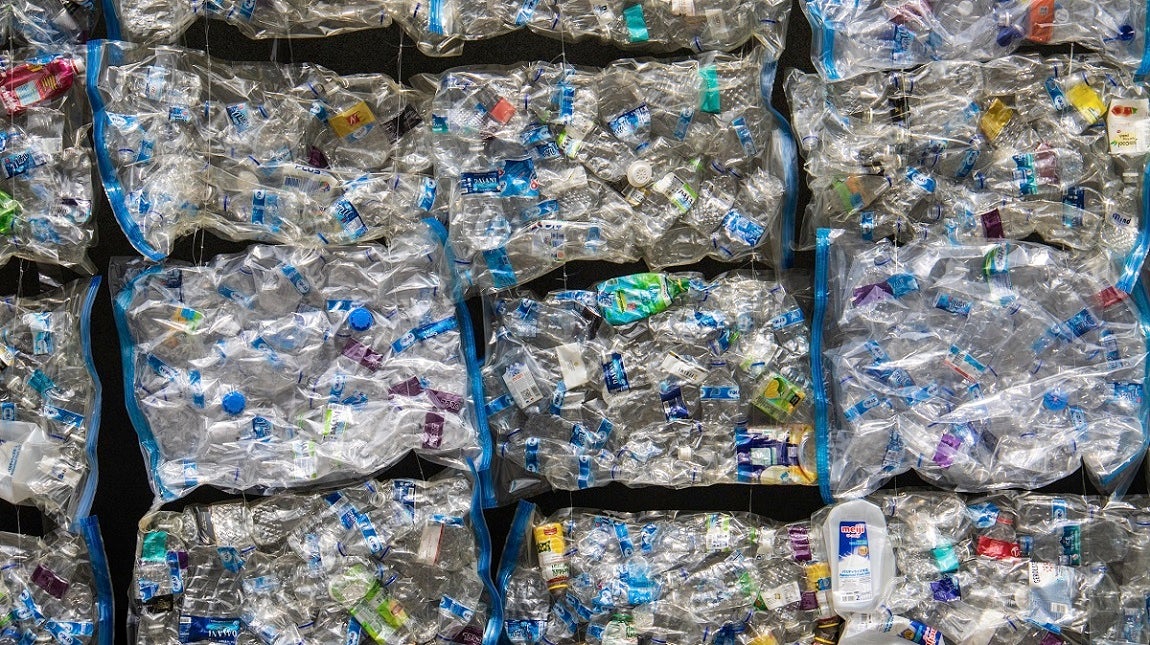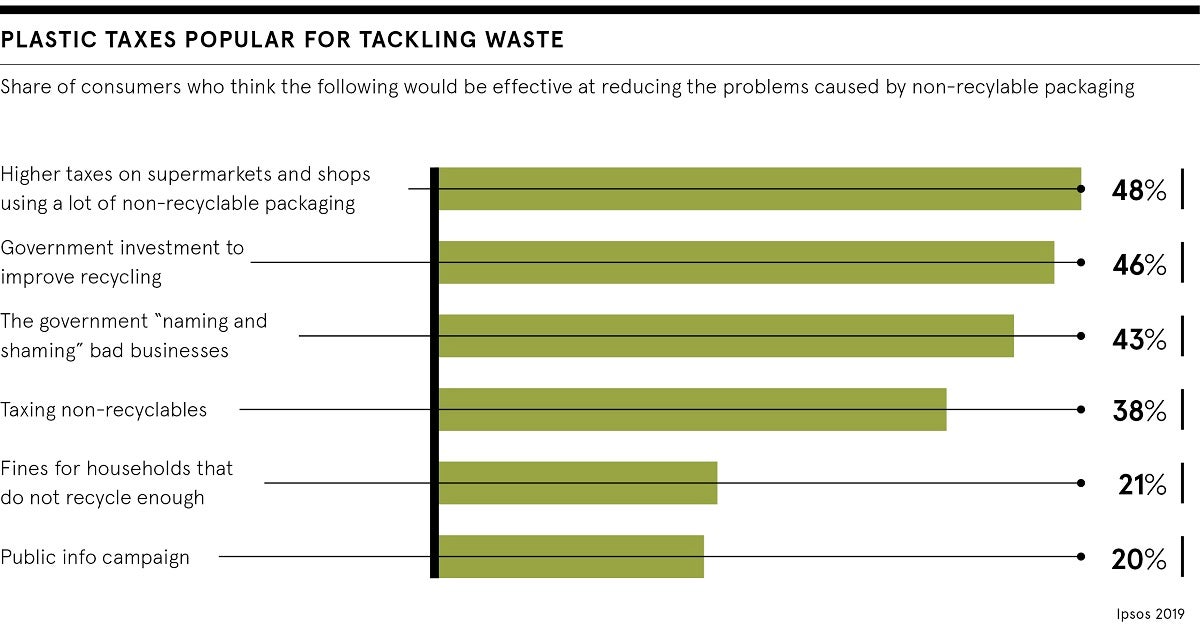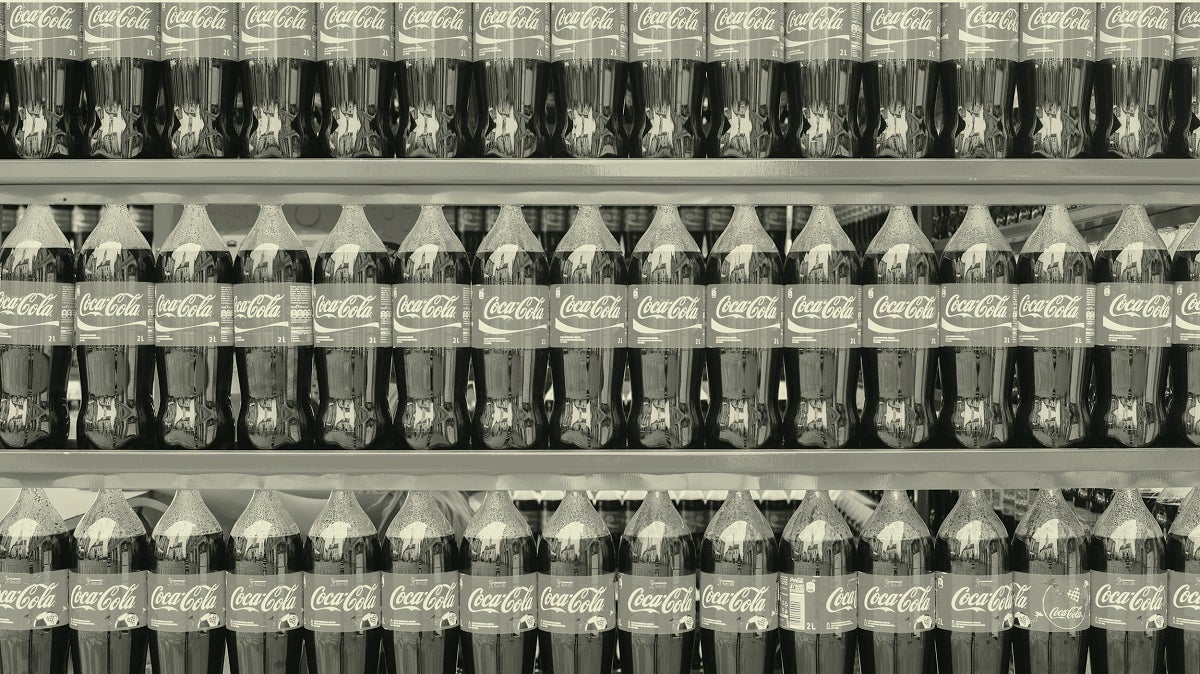
With more than five million tonnes of materials processed every year and a combined turnover of £19 billion, the UK is one of the top five processors of plastics in the European Union. But the majority of plastic packaging, which accounted for 44 per cent of the UK’s plastic use in 2017, is made from virgin rather than recycled plastic.
In March 2018, the government announced it will introduce a plastic packaging tax aimed at reducing the environmental impact of the two million tonnes of plastic packaging used each year. Coming into effect from April 2022, plastic packaging produced in, or imported into the UK, which does not contain at least 30 per cent recycled plastic, will be subject to a levy of £200 a tonne.
Given that virgin plastic is estimated to be around £500 a tonne cheaper, the new tax is intended to create an economic incentive for businesses to use recycled material, stimulating demand and increasing rates of recycling collection, shifting away from damaging landfill or incineration processes.
Improving plastic waste infrastructure
Research by Imperial College London estimates that if it is transferred to households by packaging producers, the cost of the plastic packaging tax would be around 16p a week per household, while encouraging investment in the domestic recycling infrastructure and incentivising greener product design and resource security.
“It’s a good start,” says Tim Duret, technology and organics director for Veolia UK and Ireland, a leading recycling and waste management company. “The plastic packaging tax could be a key incentive. It will create a more circular economy and will drive manufacturers to more eco packaging designs. It will also create more jobs and better infrastructure in the recycling industry.”
Duret believes a “gradual, incremental increase” above the current targeted amount of recycled plastic packaging should be rolled out over time, pointing to the example of PET (polyethylene terephthalate) plastic bottles, which can already be made entirely from recycled material. But key to that growth will be investment. “The UK needs better recycling infrastructure,” he adds.
How the plastic packaging tax might impact businesses
Barry Turner, director of the BPF Plastics and Flexible Packaging Group, considers this a major problem. Unlike the rest of Europe, most councils in the UK do not collect all plastic packaging from consumers and businesses. As a result, Turner says, the UK has an underinvested waste management infrastructure and is highly dependent on exporting its plastic waste and importing quality recyclate to meet domestic needs.
He says to ensure the success of the plastic packaging tax, whose consultation concluded last month, the UK must reinvest the income to guarantee it has the capacity to collect and process all plastic. “Not all councils collect pots and trays and very few collect film,” he says.

According to Turner, the tax could also, due to regulatory, supply, quality or functional constraints, result in an extra cost to business of £300 million a year, given that, for example, recycled plastic is banned for uses including pharmaceutical packaging. He claims this cost applies to 26 per cent of the weight of all plastic packaging in use and around 70 per cent of all the items sold by grocery outlets.
“What the tax will do is provide an incentive to use recycled content where it is not being used; what it wont do is enable it to be used in those applications where regulatory restrictions prevent it being used,” he adds. “They should be exempted.”
Reaching recycled material sustainability
Industry experts agree that while the plastic packaging tax is likely to improve long-term sustainability, manufacturers will also require significant preparation to adjust in time. David Harding Brown, chief executive of ecoVeritas, a packaging compliance provider that has around 70 UK clients, says that companies that don’t adapt could go to the wall as compliance costs rise.
Packaging recovery note charges, the compliance fees companies must pay towards the collection and disposal of plastic packaging waste, have risen from an average of £50 a tonne in 2017 to more than £400 in 2019. However, when these costs are modelled for large and mid-sized businesses, it is calculated that for every £1,000 a company was spending on plastic compliance in 2017, they are now spending more than £8,000.
“When you have a business that operates on very small margins, either the company will go out of business or the cost will be passed on to the consumer,” says Harding Brown. “They need to identify their liabilities and optimise where possible. There’s a storm coming.”
When you have a business that operates on very small margins, either the company will go out of business or the cost will be passed on to the consumer
Despite these caveats, it is widely thought the plastic packaging tax will revolutionise the UK’s recycling industry. “The problem with recycled plastics is that virgin plastic has tended to be less expensive,” says Dr Teresa Domenech, lecturer in industrial ecology at University College London. “But this tax should make secondary plastics more attractive.”
There is a risk that materials other than recycled plastics could be incentivised, according to Domenech, or that recycled plastics will be imported from other countries rather than being produced in the UK. But if the correct system is in place, she believes the recycling targets could be exceeded. “It will take time and investment to reach the targets, but you could reach even higher levels of recycled material in the future,” she concludes.

Three companies’ plastic pledges
Coca Cola
By 2025, Coca-Cola has pledged to ensure its packaging is 100 per cent recyclable and that at least 50 per cent of the content of its plastic bottles comes from recycled content, with an aim to achieve 100 per cent in the future. Coca-Cola in western Europe is set to reach 50 per cent recycled content in 2023, two years earlier than its stated goal. The Honest, Glaceau Smartwater and Chaudfontaine brands have already transitioned to 100 per cent recycled plastic. It has worked to remove all unnecessary or hard-to-recycle plastic through lightweighting and the removal of all secondary packaging made from plastic.
The Co-op
The Co-op supermarket chain has committed to only using 100 per cent recyclable plastic packaging where it helps reduce food waste and extends longevity. In November 2018, the Co-op became the first UK retailer to replace single-use plastic carrier bags with compostable alternatives, removing around 40 million single-use plastic bags from circulation. By the end of 2021, it has pledged to make 100 per cent of its own brand packaging easy to recycle, a move which will be facilitated by the rollout of the UK’s largest scheme to recycle plastic film, and to use a minimum of 50 per cent recycled plastic in food packaging, bottles, tubs and trays.
Mattel
Toy manufacturer Mattel has set the goal of achieving 100 per cent recycled, recyclable or bio-based plastic materials in its products and packaging by 2030. It has looked to adopt pioneering, sustainable materials such as the sugarcane-based plastics used in its Fisher-Price Rock-a-Stack and Baby’s First Blocks toys, which also come packaged in 100 per cent recycled or sustainably sourced material. Currently, Mattel uses 25 per cent recycled material within most of its plastic packaging and the company says it is actively working to increase this figure.

With more than five million tonnes of materials processed every year and a combined turnover of £19 billion, the UK is one of the top five processors of plastics in the European Union. But the majority of plastic packaging, which accounted for 44 per cent of the UK’s plastic use in 2017, is made from virgin rather than recycled plastic.
In March 2018, the government announced it will introduce a plastic packaging tax aimed at reducing the environmental impact of the two million tonnes of plastic packaging used each year. Coming into effect from April 2022, plastic packaging produced in, or imported into the UK, which does not contain at least 30 per cent recycled plastic, will be subject to a levy of £200 a tonne.
